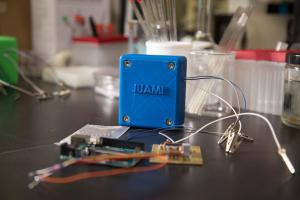
Chris Li’s inspiring story began in the summer of 2016, when he travelled to Tanzania with Penn State chemistry department head Tom Mallouk to teach a two-week summer course organized by the Joint U.S.-Africa Materials Institute (JUAMI).
While he was there, Li recalled, the electricity would go out at least three or four times a day— “just a regular thing,” he said. “It’s normal for them. They don’t have a stable power grid.”
Li and Mallouk were teaching in Arusha, at the Nelson Mandela Institute of Science and Technology—“one of the better schools in East Africa,” Li said—and they realized that even there, the research equipment was still very limited compared to the technology at most American universities.
When they got back home, Li said, “we decided that we would submit a proposal and then build some equipment for them to use. A group of U.S. and African students, we teamed up together, wrote a proposal to the Materials Research Society, and we actually got funding to develop this project.”
Their project was to build a potentiostat—a device that measures current and voltage—that they could ship to African universities to enable students there to conduct energy-related research.
The challenge was that a single potentiostat of the type Li uses in the lab costs between $5,000 and $10,000—effectively putting a lab’s supply of such equipment well beyond the budgets of even the best African universities.
So Li’s group built one for $40. They designed and custom-fabricated the hardware from existing designs and components, then 3D-printed the case and assembled the device in-house.
When the devices are shipped, they will include Li’s custom software interface—a standalone executable file that can be used without having to be installed on a computer—and a set of basic experiments so students can get the device up and running.

“It’s a kit that people can start using right away,” Li said. “We’ve built a dozen to start, and we’ll ship them to several African universities where we hope that they will be used in undergraduate labs so that students can learn how to do electrochemistry—how to build batteries, fuel cells, solar cells.”
Li’s group is working with a team of local African students to distribute the devices directly to the universities. And following the initial run, Li says, he plans to scale up production to make and ship another 50 or so devices in early 2018.
“We want to help,” he explained. “There is definitely a problem with energy in East Africa. It’s not a problem that this device is immediately going to solve, but I hope that it will help African students to learn more about electrochemistry and do more energy-related research in order to someday solve this problem.”
Chris Li is a graduate student in the Department of Chemistry at Penn State.
